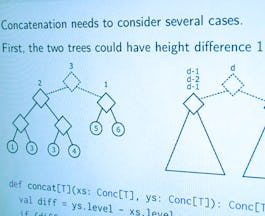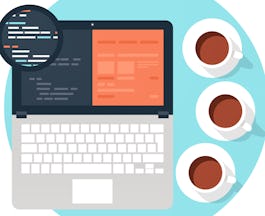Filter by
The language used throughout the course, in both instruction and assessments.
Explore the Parallel Computing Course Catalog

École Polytechnique Fédérale de Lausanne
Skills you'll gain: Algorithms, Scala Programming

University of Colorado Boulder
Skills you'll gain: Computer Programming, Distributed Computing Architecture, Computational Thinking, Computer Architecture, Computer Programming Tools, Linux

Rice University
Skills you'll gain: Computer Programming, Java Programming, Algorithms, Computational Thinking, Theoretical Computer Science, Computational Logic, Critical Thinking, Distributed Computing Architecture, Programming Principles

University of Illinois Urbana-Champaign
Skills you'll gain: Cloud Computing, Distributed Computing Architecture, Cloud Infrastructure, Computer Networking, Cloud Storage, Cloud Platforms, Network Architecture, Apache, Cloud Applications, Cloud Engineering, Computer Architecture, Data Management, Algorithms, Software-Defined Networking, Software As A Service, Network Analysis, Theoretical Computer Science, Amazon Web Services, Big Data, Cloud-Based Integration, Software Architecture, Computational Thinking, Computer Programming, Cryptography, Security Engineering, Human Learning, Python Programming

Rice University
Skills you'll gain: Computer Programming, Java Programming, Algorithms, Theoretical Computer Science, Computational Thinking, Distributed Computing Architecture, Software Engineering, Computational Logic, Critical Thinking, Data Structures, Programming Principles

Skills you'll gain: Python Programming, Machine Learning, Data Science, R Programming, Data Analysis, Professional Development, Algorithms, Big Data, Cloud Computing, Computer Programming, Data Mining, Data Model, Data Visualization, Databases, Deep Learning, Exploratory Data Analysis, General Statistics, Human Learning, IBM Cloud, Machine Learning Algorithms, Plot (Graphics), Probability & Statistics, Regression, SQL, Writing

Rice University
Skills you'll gain: Computer Programming, Python Programming, Programming Principles, Mathematics, Algorithms, Computational Logic, Computational Thinking, Computer Programming Tools, Critical Thinking, Problem Solving, Theoretical Computer Science, Visualization (Computer Graphics), Computer Graphics, Data Structures, Graph Theory, Probability & Statistics, Combinatorics

Stanford University
Skills you'll gain: Algorithms, Theoretical Computer Science, Computer Programming, Problem Solving, Graph Theory, Mathematics, Data Structures, Computational Thinking, Mathematical Theory & Analysis, Critical Thinking, Computational Logic, Programming Principles, Software Engineering

Johns Hopkins University
Skills you'll gain: Machine Learning, Algorithms

Vanderbilt University
Skills you'll gain: Computer Programming, Other Programming Languages, Matlab, Data Analysis, Algorithms, Theoretical Computer Science, Data Visualization, Mathematics, Plot (Graphics), Visualization (Computer Graphics), Computer Graphics, Statistical Machine Learning, Data Analysis Software, Problem Solving, Programming Principles

University of Illinois Urbana-Champaign
Skills you'll gain: Computer Programming, C Programming Language Family, Data Structures, Algorithms, C++ Programming, Theoretical Computer Science, Programming Principles, Computational Thinking, Problem Solving, Computer Programming Tools, Critical Thinking, Graph Theory

University of California, Santa Cruz
Skills you'll gain: C Programming Language Family, Computational Logic, Computer Programming, Programming Principles, Algorithms, Computational Thinking, Computer Programming Tools, Critical Thinking, Mathematics, Problem Solving
Searches related to parallel computing
In summary, here are 10 of our most popular parallel computing courses
- Parallel programming: École Polytechnique Fédérale de Lausanne
- Introduction to High-Performance and Parallel Computing: University of Colorado Boulder
- Parallel Programming in Java: Rice University
- Cloud Computing: University of Illinois Urbana-Champaign
- Parallel, Concurrent, and Distributed Programming in Java: Rice University
- IBM Data Science: IBM
- Fundamentals of Computing: Rice University
- Algorithms: Stanford University
- Introduction to Parallel Programming with CUDA: Johns Hopkins University
- MATLAB Programming for Engineers and Scientists: Vanderbilt University










